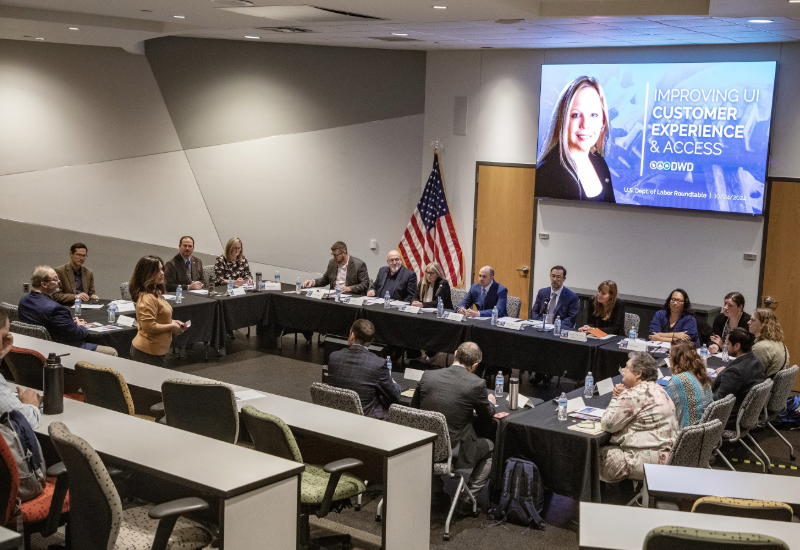The pandemic exposed long-standing problems in the Unemployment Insurance (UI) system that hit disadvantaged communities the hardest. The Department of Labor is committed to addressing these flaws and breaking down barriers that stop workers from getting help when they need it most. President Joe Biden’s American Rescue Plan Act (ARPA) secured $1 billion to help states enhance their unemployment infrastructure.
On Oct. 24, I traveled with Assistant Secretary for Employment and Training José Javier Rodríguez in Wisconsin to see how the Badger State is using $32 million of ARPA funds to improve customer experience and access to benefits. While we were there, our Director of UI Modernization Andy Stettner facilitated a discussion with Assistant Secretary Rodriguez, Wisconsin Department of Workforce Development Secretary Amy Pechacek and representatives from business and labor. The discussion celebrated progress modernizing unemployment insurance in Wisconsin since the pandemic and allowed us to learn critical issues the state continues to address.
Secretary Pechacek highlighted Wisconsin’s record job numbers and employment rates over the past four years. The state is active in UI modernization and was one of the first to volunteer to have a group of experts, called Tiger Teams, help identify new UI strategies.
The benefit application stage can be a daunting process, as many marginalized or vulnerable workers may not know they are eligible to receive benefits or how to apply. Wisconsin’s UI administrator Jim Chiolino detailed the state’s ARPA-funded improvements to make navigating the system easier, like:
- Using plain language,
- Improving accessibility for disabled claimants, and
- Translating correspondence, website information and forms into Spanish and key materials into other languages like Rohingya.
Brenda Lewison, an attorney at Legal Action Wisconsin, expressed gratitude for the Spanish translations, given the number of non-English speaking clients from Mexico and Texas who travel to Wisconsin for jobs. Susan Quam with the Wisconsin Restaurant Association mentioned how using plain language is just as important for employers as it is for claimants.
Making applications easier to use helps workers get benefits and helps ensure payments go to eligible individuals. The Department entered an agreement with the U.S. Postal Service to allow for in-person ID verification for UI benefits at participating retail postal locations nationwide. Later this year, Wisconsin will become one of at least 17 states to offer this service.
The Navigator Program is another component of the work to break down barriers to access UI. At the event, navigators from the United Migrant Opportunity Services (UMOS) discussed how they provide hands-on assistance to show claimants how to use the technology and enter information. Panelists emphasized their clients face challenges filling out online applications, even when a navigator is there to help, and clients who communicate with American Sign Language also face barriers when they need to contact the state.
Panelists acknowledged the role of community partners like unions and nonprofits that provide crucial in-person help to make the process less daunting for claimants. For example, Douglas Bartz with the Southeast Wisconsin Workforce Development Board noted that clients from all generations visit American Jobs Centers for help with online UI applications.
As the discussion wrapped up, panelists reiterated the importance of keeping the momentum going and continuing to foster collaboration between states. Equity, access and user experience are at the forefront of UI modernization. Benefits are lifelines for millions of working families, and no one should be left behind.
Britt Stich is the deputy assistant secretary for the U.S. Department of Labor’s Employment and Training Administration.



